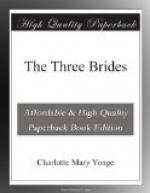“Because a set of rascals choose to bring their villainies there you would have the sport of the whole neighbourhood given up. ’No cakes and ale’ with a vengeance!”
“The cakes and ale that make a brother offend ought to be given up.”
“That sentences all public amusements.”
“Not necessarily. The question is of degree. Other amusements may have evil incidentally connected with them, and may lead to temptation, but it is not their chief excitement. The play or the opera is the prime interest, and often a refined and elevated one, but at races the whole excitement depends upon the horses, and is so fictitious that it needs to be enhanced by this betting system. No better faculty is called into play. Some few men may understand the merits of the horse; many more, and most of the ladies, simply like the meeting in numbers; but there is no higher faculty called out, and in many cases the whole attraction is the gambling, and the fouler wickedness in the background.”
“Which would be ten thousand times worse if all gentlemen stood aloof.”
“What good do these gentlemen do beyond keeping the contest honourable and the betting in which they are concerned? Do not they make themselves decoys to the young men on the border-land who would stay away if the turf were left to the mere vulgar? Why should they not leave it to drop like bull-baiting or cock-fighting?”
“Well done, Julius!” said Raymond. “You will head a clerical crusade against the turf, but I do not think it just to compare it with those ferocious sports which were demoralizing in themselves; while this is to large numbers simply a harmless holiday and excuse for an outing, not to speak of the benefit to the breed of horses.”
“I do not say that all competitions of speed are necessarily wrong, but I do say that the present way of managing races makes them so mischievous that no one ought to encourage them.”
“I wonder what Backsworth and Wil’sbro’ would say to you! It is their great harvest. Lodgings for those three days pay a quarter’s rent; and where so many interests are concerned, a custom cannot lightly be dropped.”
“Well,” said Raymond with a sigh, “it is not pleasure that takes me. I shall look on with impartial eyes, if that is what you wish.”
Poor Raymond! it was plain that he had little liking for anything that autumn. He rode over to Swanslea with Cecil, and when he said it was six miles off, she called it four; what he termed bare, marshy, and dreary, was in her eyes open and free; his swamp was her lake; and she ran about discovering charms and capabilities where he saw nothing but damp and dry rot, and, above all, banishment.




